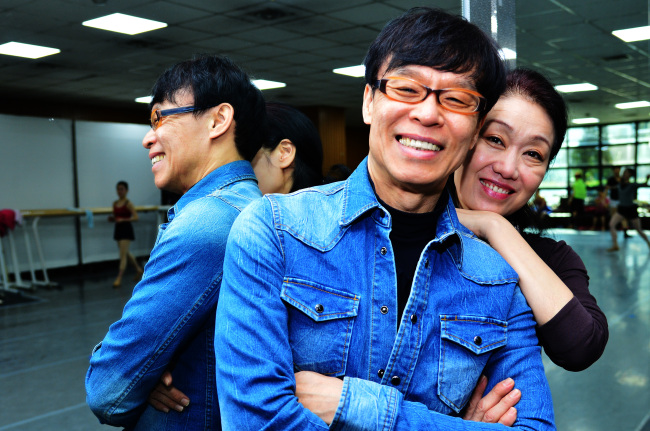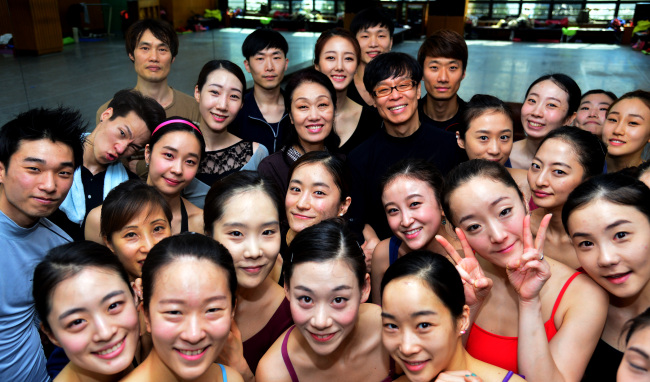The pensively fragile and emotionally shattered Giselle fumbles across the stage after learning that the man she had fallen hopelessly in love with was not the man she thought, resulting in her dying of heartbreak.
For regular theatergoers, this is a variation on a scene they know far too well. “Giselle” is one among a long laundry list of classical ballets that have stood the test of time. However to some, the excessive reprise of such classical stories can place a stymie on creativity and conceptual growth.
Feeling trapped in a cyclical continuum of the same old, classical ballets that have been around for generations, husband and wife duo James Jeon and Kim In-hee decided it was time to break free.
Jeon and Kim first met in 1986 while taking an open dance class at the David Howard Ballet Center in New York City. At the time, Jeon was a principal dancer at the Florida ballet and whenever he had time off, he would go to New York and partake in dance training classes.
During the night classes, he overheard someone speaking Korean, which immediately drew his attention. Although nothing beyond the mere exchange of pleasantries happened on their first encounter, fate meant their lives would soon cross again.
Jeon was invited to perform in Korea in the Universal Ballet Company’s production of “La Fille Mal Gardee” a year after the two first met. To his surprise, he found himself dancing on the same stage as Kim, who was then a Universal principal dancer.
“In the beginning, we weren’t that close. I mean I was just a guest dancer and she was a principal,” Jeon said with a cheeky grin on his face. “But the director ended up inviting me to join the company’s Asia tour, so In-hee and I were able to spend more time together.”
Despite the two’s artistic status divide as principal and guest, the dancers were engaged that same year and wed the following spring.
In 1994, both dancers joined the Korea National Ballet Company as principals, where they intended to spend their dancing careers and then retire. However, shortly after joining the state-run ballet company, they felt something was lacking inside them artistically.
“Both James, having studied at Julliard, and I really wanted to do some more creative productions, but we were in a situation where we were limited to only performing international repertories,” Kim said. “So we just kept thinking to ourselves how nice it would be if we got to perform our own productions.”
During a time when ballet did not share mass popularity with the general Korean public, the couple came to the conclusion that the local ballet scene
needed to go beyond expelling productions that originated elsewhere. It needs to offer locals opportunities to see entirely new dance repertoires that were modern and more appealing to the masses.
Three months from the moment the couple began to discuss their desires to break free, Seoul Ballet Theatre launched in 1994 and is now located in the city of Gwacheon, Gyeonggi Province.
SBT ― a maverick on the ballet scene In many ways, SBT is like no other in Korea’s ballet scene.
Its repertoire is filled with either modern or original works, many choreographed by Jeon.
“Rage,” which the SBT will stage on June 5 and 6 in celebration of its 20th anniversary, is a non-stop 70-minute, fury-provoking, action-packed modern dance piece choreographed by the creative director.
Its dancers are different, too.
“You know at the Korea National Ballet, Universal, or any major classical ballet company ― they all have specific body requirements and face types (for dancers). So when you watch their ballets, everyone on the stage just looks the same,” said Jeon, adding that his company does not have such requirements for dancers.
“I don’t care about their faces or what kind of body they have. All I care about is if they can dance and if they can move.”
In the 20 years of the company’s history, there were three major financial slumps that almost led the couple to close up shop. But they insisted on the proper treatment of dancers.
However, regardless of the founders’ 20-year milestone of fighting against the mainstream masses, there was a time when Jeon and Kim did not find themselves in an uphill battle, trying to keep the company fiscally afloat.
“We are the only non-major independent ballet company that pays their dancers,” says Jeon. “This is something that is very important to us because the happiness of our dancers matter. They need to be able to support themselves.”
“Although it has not been easy for us at all since we started, In-hee and I always try to find a way to makes things work … to take care of our dancers and to continue to support members of our community.”
Giving back
“When James and I first got married, we made a promise to each other,” said Kim. “We promised not to have children so that we could fully devote ourselves to treat our company like our child and really put all our efforts into raising it properly.”
After taking part in a short documentary film about sharing one’s artistic talents in order to help those less fortunate, the two dancers were moved by the charitable spirit of giving back to the community that has supported them and their company throughout the years.
Having lived in New York and encountered many homeless people on the street, one of Jeon’s ongoing pet projects was offering weekly dance classes for the local homeless community. The classes are said to provide students with an opportunity to experience a sense of belonging, as well as boosting their self-esteem. At the end of the year, the students then have the rare opportunity to perform in front of an audience in the SBT’s annual production of “The Nutcracker.”
The couple also hosts weekly community classes for the mentally and physically challenged, ballets for spouses and open public classes for the local community members.
“… If we had not been helping out our local community, then we would have lost sight of the true value of our art,” said Kim.
For the directors, art is not only about artists or the performers on stage.
“Art is community. It is because we have a community that we have art ― without the people, it’s impossible,” Jeon added.
“Glory? We don’t need the glory. The legacy we want to leave is that of a company that cares for people.”
By Julie Jackson (
juliejackson@heraldcorp.com)







![[Herald Interview] 'Trump will use tariffs as first line of defense for American manufacturing'](http://res.heraldm.com/phpwas/restmb_idxmake.php?idx=644&simg=/content/image/2024/11/26/20241126050017_0.jpg)
![[Exclusive] Hyundai Mobis eyes closer ties with BYD](http://res.heraldm.com/phpwas/restmb_idxmake.php?idx=644&simg=/content/image/2024/11/25/20241125050044_0.jpg)
